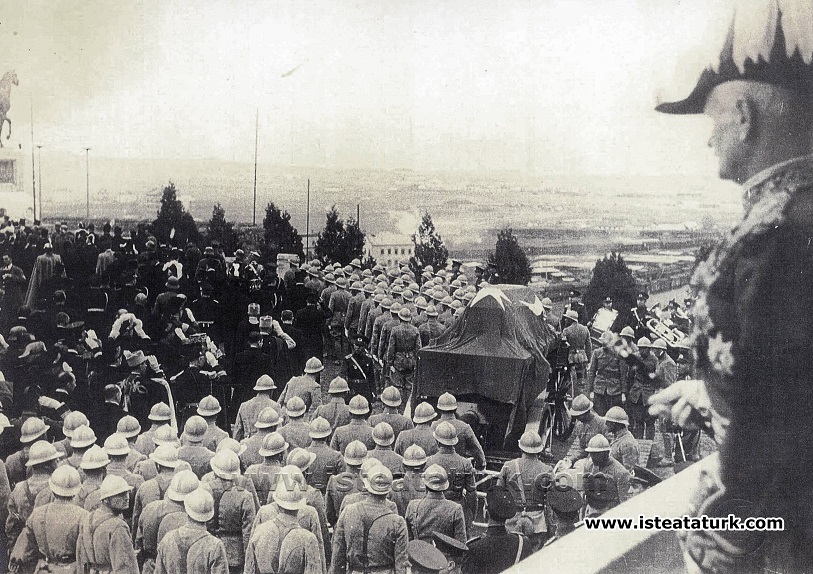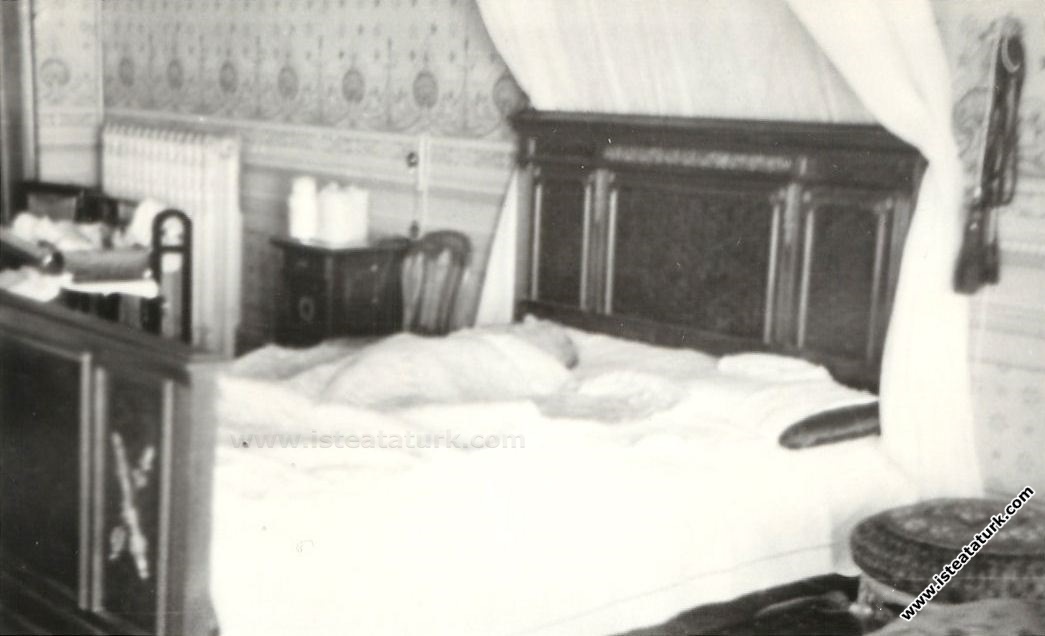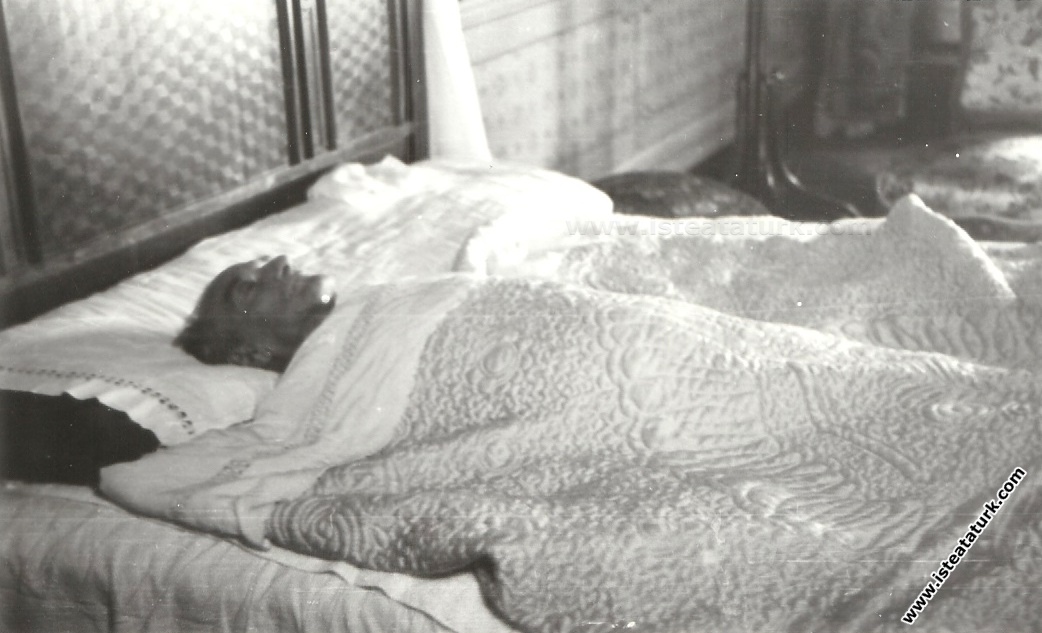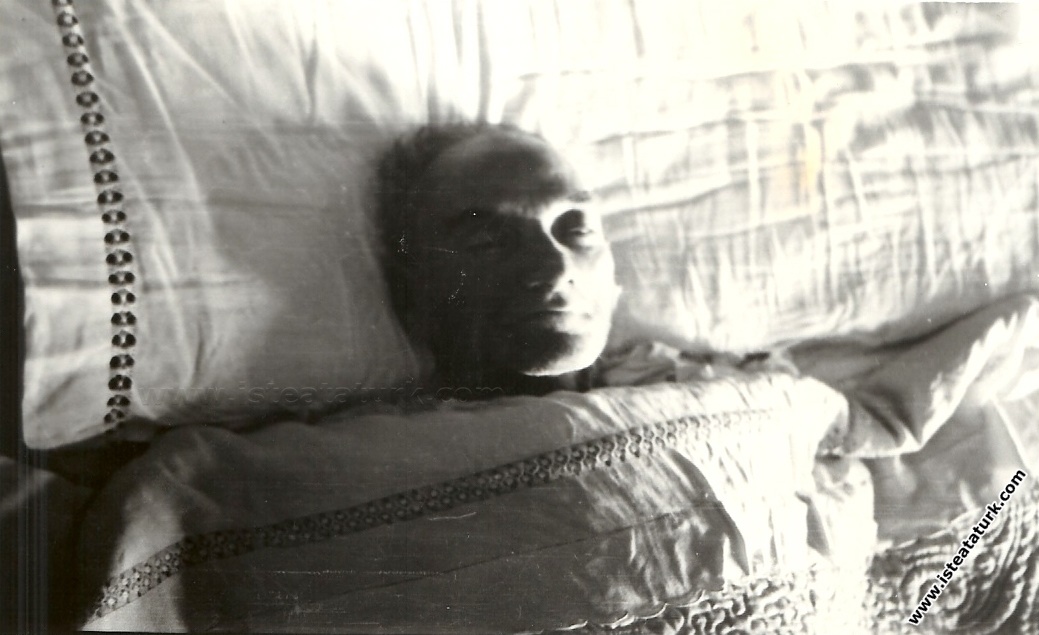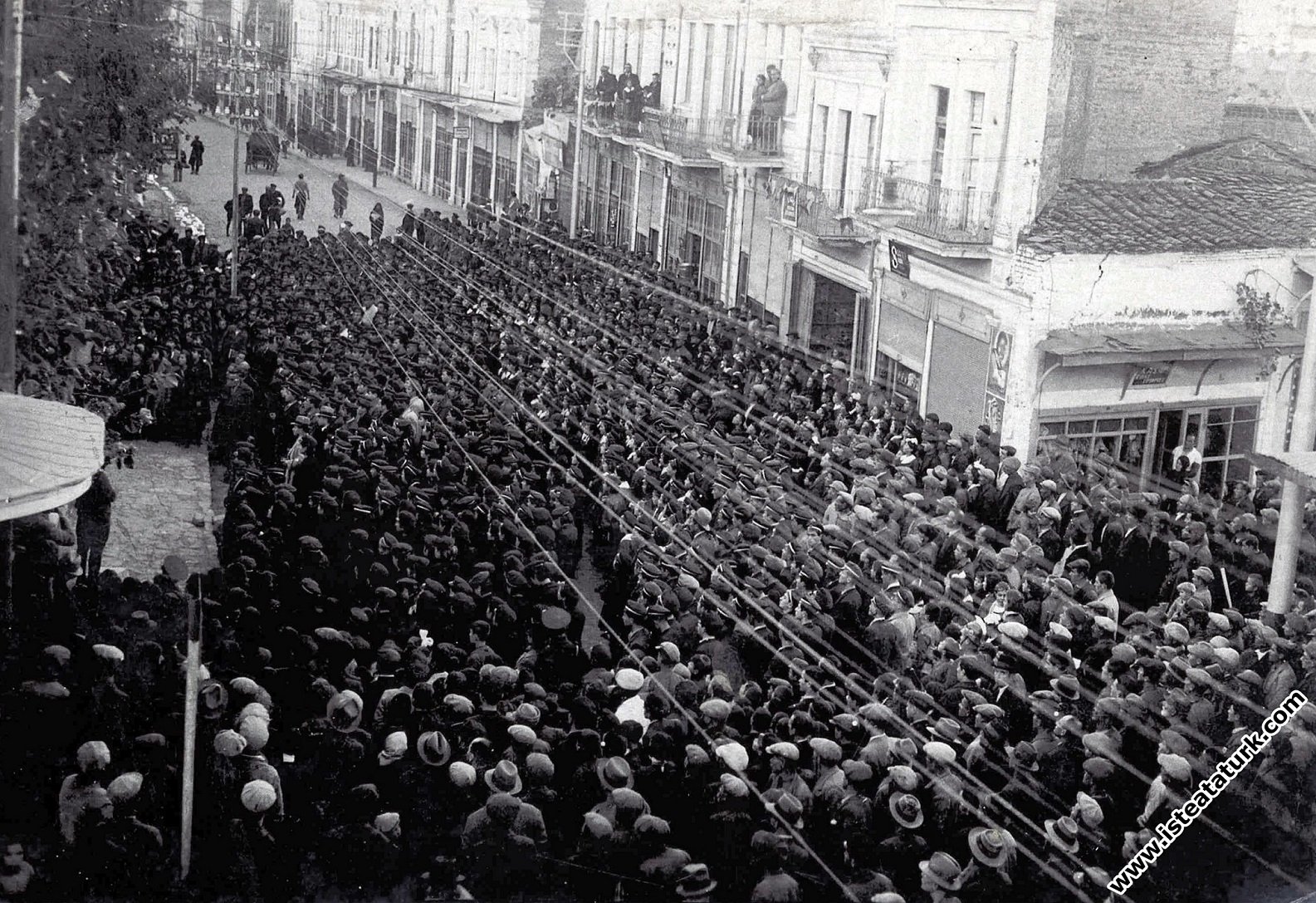Sir William Birdwood Greets Atatürk Standing! (21.11.1938)
Sir William Birdwood Greets Atatürk Standing! (November 21, 1938)
Sir William Birdwood Greets Atatürk Standing!
3 years after the 1915 Çanakkale War...
20 November 1918 Mustafa Kemal Pasha, Sir William Birdwood* Interview
On Saturday, November 20, 1918, an interesting event takes place in Mustafa Kemal's apartment in Pera Palas. Atatürk was under the overwhelming weight of a heavy traffic of political references in those days. But there is a foreign general who is eager to find a free time and meet with Mustafa Kemal. General Sir William Birdwood, who settled in the Pera Palas Hotel with his headquarters... This general was defeated by Mustafa Kemal three times in the Çanakkale Wars, although his soldiers were superior in terms of quantity and equipment. He is in a state of amazement and amazement at how he succumbed to such material superiority. Seeing this hero closely and listening to the reasons for this chain defeat from his own mouth makes him squirm in curiosity. The athlete, who was given to him as an escort officer, begs Mustafa Kemal to accept him through Mr. Sedat Rıza.
- "Here you go" says Mustafa Kemal.
The two generals face each other. Birdwood is very respectful. Rasim Ferit Bey was with Mustafa Kemal Pasha. After the good-bye, Birdwood asked the gnawing "how did he beat us" for two years? Wants to get the answer to the question:
- “How did you beat us, Mr. Commander?”
Someone other than Mustafa Kemal could have bragged about this success, which is rare in the history of world war. Yet he - just as he treated Trikopis - preserves the honor of this general, crushed by defeat.
- "You and we both have history magazines," he says; "makes history."
Birdwood repeats his request:
- “Your Excellency, I want to hear from you. Please.”
Mustafa Kemal asks Rasim Ferit Bey, who is next to him, a pen and paper; the room holds out a napkin paper and a gold-shielded pencil. Mustafa Kemal draws a sketch, pointing to their place on the paper;
- “You came ashore in water history,” he says; You stood there until such and such an hour. We were on that line. Everything was in your favor. Why did you stand in the line and why didn't you move forward?"
- “Our soldiers were very tired, Birdwood replies.”
This time Mustafa Kemal draws the sketch of Cokbayırı:
- “You moved in this direction on such and such a day, you got this situation; Why didn't you move forward?"
- “As we advanced, the water did not reach the back. Our soldiers were dehydrated and stopped.”
Our ancestors say that no bullet is thrown at the wounded. Mustafa Kemal also expresses the Turkish nobility and virtue with the following joke:
- “You see, I didn't do anything. First tiredness, then thirst stopped your army.”
Birdwood gets up and hugs Mustafa Kemal:
- “I've never met a heroic and high-character soldier like you.”
Then pointing to the sketch and pencil:
- He says "Will you excuse me"; "Let me keep this sketch and pen as a precious keepsake."
And it stores.
The year is 1935… Years passed, Birdwood rose to the rank of marshal. His last duty is “Commander-in-Chief of the Indian Army” . He was also given the title of Baron. Atatürk's admiration and love still maintains its warmth. He came to Istanbul on the 26th of August, 1935, to live his old memories and breathe the air that Atatürk breathed. Cumhuriyet newspaper gives the following headline about this event: He entered Istanbul 20 years later, but as a traveller.
The year is 1938… Birdwood feels one of the greatest pains of his life when he receives the news of Atatürk. He is quite old. He is also sick… But no matter what, he wants to attend the funeral, bow down in front of the coffin of the greatest soldier the world has raised, and make him his last mission on his eternal journey. He informs the British Government of his desire and comes to Ankara.
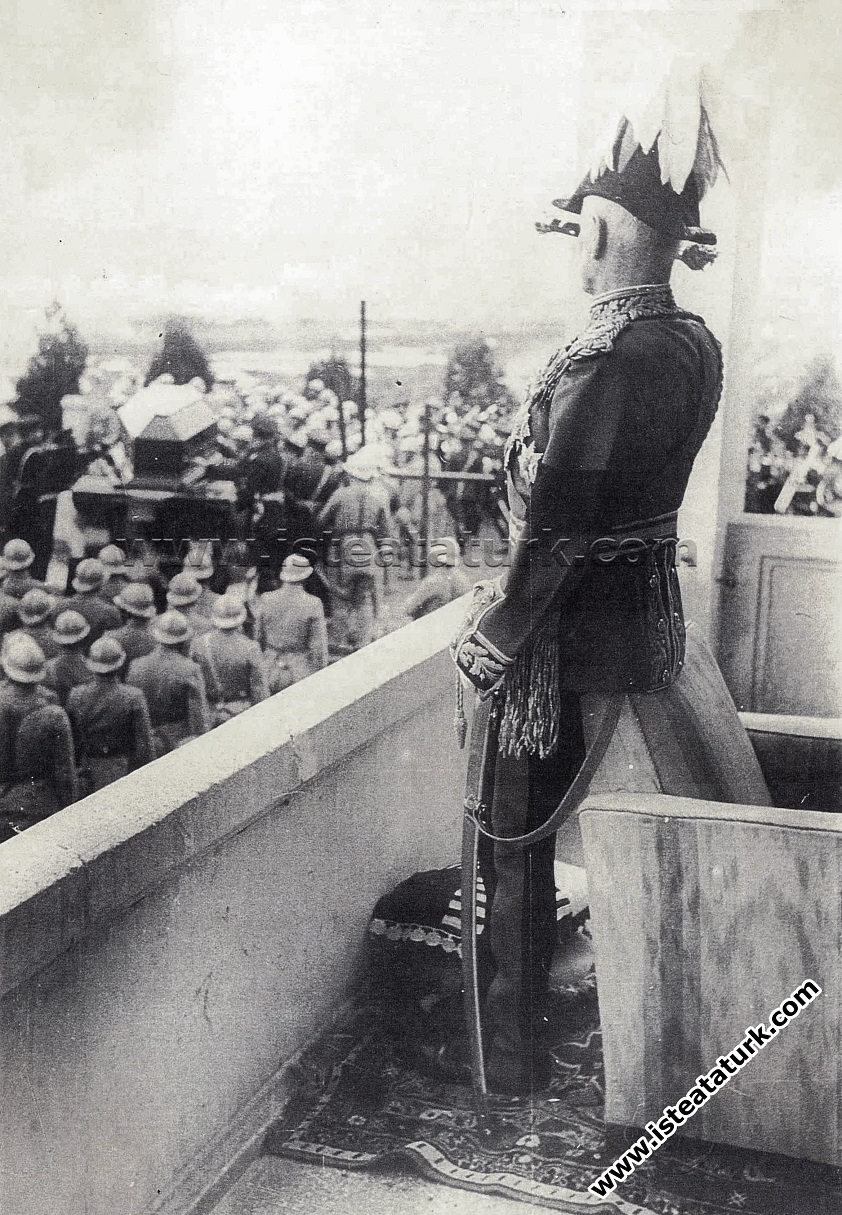
While Atatürk's coffin is being taken to the temporary grave, the Commander-in-Chief of the Indian Army, Field Marshal Baron William Birdwood, is supported under his feet so that he can stand on the balcony of the Community Center and do his last farewell mission.
%20(2).jpg)
Feld Marshal Baron William Birdwood at Ankara Community Center on 21 November 1938
%20(4).jpg)
%20(7).jpg)
Feld Marshal Baron William Birdwood at Ankara Community Center on 21 November 1938
Birdwood is crying loudly as Atatürk's coffin passes in front of him.
Source: 1- Atatürk's Studies in Istanbul, (1899 - 16 May 1919), Sadi Borak, 2nd Edition 1998, Kaynak Publications, ISBN: 975-343-233-X. Pages: 153-155
2- Atatürk's Diary with Bibliography from His Birth to His Death. prof. Dr. Utkan Kocaturk. Ataturk Research Center. Ankara 2007 Second Edition. ISBN: 975-16-1191-1. Page: 119
Note: Sadi Borak gives the date of Mustafa Kemal and Birdwood meeting as 20 November 1918 in Atatürk's Studies in Istanbul. This date falls 7 days after Mustafa Kemal's arrival in Istanbul. However, Prof. Dr. Utkan Kocatürk gives this date as 16 November 1918 in his work named Atatürk Diary with References from Birth to Death.
*William Riddell Birdwood Biography:
(1865-1951) A British soldier and field marshal, Birdwood was born in India in 1865. He studied first at Clifton College and then at the Royal Military College in Sandhurst. Gradually rising in his profession, he received the titles of general in 1917 and field marshal in 1925. In India, Birdwood participated in the Hazara (1891), Isazai (1892), Tirah (1897-98) campaigns, the Battles of Chagra Kotal, Dargai, Samphagha, and military operations in the Bazar Valley. During the South African War (1899-1902), he commanded the mounted brigade in Natal, then served as military clerk to Lord Kitchener, the commander-in-chief. In 1908, he served as chief of staff on the Mohmand campaign and was awarded the "Distinguished Service Order" that same year. In the First World War, He served in the Mediterranean Expeditionary Force. Birdwood, who first became the commander of the Australian and New Zealand Army (Anzac), was later appointed commander-in-chief of the entire army. During the evacuation of the Gallipoli peninsula in 1915 and 1916, he commanded the Çanakkale Army, then the Australian and New Zealand soldiers, and then the 5th Army in France. He gained a great reputation for handling the Anzac soldiers well. The confidence these forces had in him was cited as the main reason for the victory on the western front and earned Birdwood the title of "Soul of Anzac". Birdwood, who became baronet at the end of the war, also received a monetary reward of £10,000. In 1920, he was appointed as the commander of the Indian Northern Army, and in 1925-30 he served as the commander-in-chief of the entire Indian army. 1938' He also received the title of Baron of Anzac and Totnes. Birwood, who was an honorary member of Peterhouse in 1921, was the director of this college from 1931-38. In 1935, he became principal of Clifton College, and also president of Deal Castle that same year. In addition to the Grand Cross and the French Legion d'honneur, he was awarded the French Croix de Guerre and many other foreign decorations. In November 1938, he attended Atatürk's funeral as the chief representative of the British Government. Birdwood, who watched the ceremony from the balcony of the Community Center (now the Turkish Hearth) building because his foot was hurt, saluted Atatürk's grave from Turkish soil by bringing some soil and stepping on it, thus expressing his last respect for a hero he met in Çanakkale. Birdword died in 1951 at Hampton Court (Middlesex).
Source: www.beyazgazete.com
